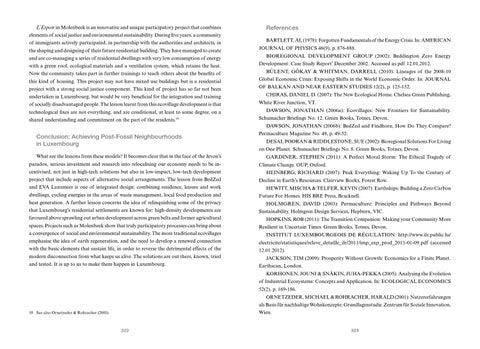L’Espoir in Molenbeek is an innovative and unique participatory project that combines elements of social justice and environmental sustainability. During five years, a community of immigrants actively participated, in partnership with the authorities and architects, in the shaping and designing of their future residential building. They have managed to create and are co-managing a series of residential dwellings with very low consumption of energy with a green roof, ecological materials and a ventilation system, which retains the heat. Now the community takes part in further trainings to teach others about the benefits of this kind of housing. This project may not have mixed use buildings but is a residential project with a strong social justice component. This kind of project has so far not been undertaken in Luxembourg, but would be very beneficial for the integration and training of socially disadvantaged people. The lesson learnt from this ecovillage development is that technological fixes are not everything, and are conditional, at least to some degree, on a shared understanding and commitment on the part of the residents.19
Conclusion: Achieving Post-Fossil Neighbourhoods in Luxembourg What are the lessons from these models? It becomes clear that in the face of the Jevon’s paradox, serious investment and research into relocalising our economy needs to be incentivised, not just in high-tech solutions but also in low-impact, low-tech development project that include aspects of alternative social arrangements. The lesson from BedZed and Eva Lanxmeer is one of integrated design: combining residence, leisure and work dwellings, cycling energies in the areas of waste management, local food production and heat generation. A further lesson concerns the idea of relinquishing some of the privacy that Luxembourg’s residential settlements are known for: high-density developments are favoured above sprawling out urban development across green belts and former agricultural spaces. Projects such as Molenbeek show that truly participatory processes can bring about a convergence of social and environmental sustainability. The more traditional ecovillages emphasise the idea of earth regeneration, and the need to develop a renewed connection with the basic elements that sustain life, in order to reverse the detrimental effects of the modern disconnection from what keeps us alive. The solutions are out there, known, tried and tested. It is up to us to make them happen in Luxembourg.
References Bartlett, Al (1978): Forgotten Fundamentals of the Energy Crisis. In: American Journal of Physics 46(9), p. 876-888. BioRegional Development Group (2002): Beddington Zero Energy Development: Case Study Report’ December 2002. Accessed as pdf 12.01.2012. Bülent, Gökay & Whitman, Darrell (2010): Lineages of the 2008-10 Global Economic Crisis: Exposing Shifts in the World Economic Order. In: Journal of Balkan and Near Eastern Studies 12(2), p. 125-152. Chiras, Daniel D. (2007): The New Ecological Home. Chelsea Green Publishing, White River Junction, VT. Dawson, Jonathan (2006a): Ecovillages: New Frontiers for Sustainability. Schumacher Briefings No. 12. Green Books, Totnes, Devon. Dawson, Jonathan (2006b): BedZed and Findhorn, How Do They Compare? Permaculture Magazine No. 49, p. 49-52. Desai, Pooran & Riddlestone, Sue (2002): Bioregional Solutions For Living on One Planet. Schumacher Briefings No. 8. Green Books, Totnes, Devon. Gardiner, Stephen (2011): A Perfect Moral Storm: The Ethical Tragedy of Climate Change. OUP, Oxford. Heinberg, Richard (2007): Peak Everything: Waking Up To the Century of Decline in Earth’s Resources. Clairview Books, Forest Row. Hewitt, Mischa & Telfer, Kevin (2007): Earthships: Building a Zero Carbon Future For Homes. HIS BRE Press, Bracknell. Holmgren, David (2003): Permaculture: Principles and Pathways Beyond Sustainability. Holmgren Design Services, Hepburn, VIC. Hopkins, Rob (2011): The Transition Companion: Making your Community More Resilient in Uncertain Times. Green Books, Totnes, Devon. Institut luxembourgeois de régulation: http://www.ilr.public.lu/ electricite/statistiques/releve_detaille_ilr/2011/imp_exp_prod_2011-01-09.pdf (accessed 12.01.2012). Jackson, Tim (2009): Prosperity Without Growth: Economics for a Finite Planet. Earthscan, London. Korhonen, Jouni & Snäkin, Juha-Pekka (2005): Analysing the Evolution of Industrial Ecosystems: Concepts and Application. In: Ecological Economics 52(2), p. 169-186. Ornetzeder, Michael & Rohracher, Harald (2001): Nutzererfahrungen als Basis für nachhaltige Wohnkonzepte: Grundlagenstudie. Zentrum für Soziale Innovation, Wien.
19 See also Ornetzeder & Rohracher (2001).
322
323
